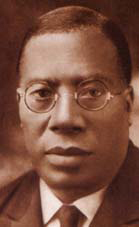History of Hymns: "Stand By Me"
“Stand By Me”
Charles A. Tindley
UM Hymnal, No. 512
When the storms of life are raging,
stand by me;
When the world is tossing me,
like a ship upon the sea,
Thou who rulest wind and water,
stand by me.
The Rev. Charles Albert Tindley (1851-1933) was one of the eminent preachers of Methodism at the turn of the 20th century. Emory University hymnologist James Abbington has called Tindley a “pastor, orator, poet, writer, theologian, social activist, ‘father of African American Hymnody,’ ‘progenitor of African American gospel music’ and ‘prince of preachers.’”
Tindley was born in Worcester County, Md., the son of Charles and Esther Tindley, but his mother died when he was only 2 years old; thus his father raised him.
 |
| Charles Tindley |
Dr. Abbington comments that biographies often refer to Tindley’s slave background, but that an autobiographical reference in his Book of Sermons (1932) implies that he was never a slave. However, economic conditions were very difficult after the death of Tindley’s mother, forcing his father to “hire him out.” African American scholar Bernice Johnson Reagon notes, “This practice was not unusual for freed Blacks. Hired-out workers often labored alongside slaves, experiencing much of the reality of the slave plantation. The major differences were that there was some remuneration . . . and hired-out workers did get the opportunity to go home.”
Tindley moved to Philadelphia as a young person, attending school at night. He said, “I made a rule to learn at least one new thing—a thing I did not know the day before—each day.” He was self-taught, never graduating from college or seminary, yet acquiring and reading more than 8,000 books in his library. He learned Greek through Boston School of Theology and Hebrew through a synagogue in Philadelphia. Tindley was awarded two honorary doctorates of divinity from colleges in North Carolina and Maryland.
Granted a license to preach from Bainbridge Street Methodist Church in Philadelphia, where he was employed as a janitor between 1880-1885, Tindley became a member of the Delaware Annual Conference. In 1902 he was assigned to Bainbridge Street Methodist Episcopal Church, this time as its pastor.
His return to the congregation as pastor was not universally appreciated, since he had served more than 15 years as their janitor; but Bainbridge Street’s 150th anniversary journal notes that “All were pleasantly surprised, for as Tindley mounted the rostrum, wearing a Prince Albert coat—then the garb of many African American Protestant preachers—he had the dignified bearing acquired during his previous appointments. They were further surprised when Tindley delivered a masterful, soul-gripping sermon that brought loud amens and ‘Praise God’ exclamations from his listeners.”
Tindley inherited an overcrowded church that continued to grow quickly under his leadership. The area was economically depressed, especially for African Americans during this time. Our hymn undoubtedly speaks to the difficulties that many of Tindley’s parishioners faced.
 |
| The burial site of Methodist pastor and hymn writer Charles Albert Tindley, at Eden Memorial Cemetery in Collingdale, Pa. One of the fathers of American gospel music, Tindley published more than 40 songs. PHOTO COURTESY EXPLOREPAHISTORY.COM/SUSAN KANE |
One of the most famous of his many gospel songs is “Stand By Me,” for which he composed both the words and the music. It was included in a collection of hymns that he published in 1905, New Songs of Paradise, No. 6.
Life was not easy for many people in the northeastern United States at the turn of the 20th century. The hymn’s opening stanza draws upon images from a narrative found in three of the Gospels in which Christ rebukes the winds and stills the raging waters. Later stanzas paint a realistic picture of life’s struggles through apocalyptic references such as “the midst of tribulation,” “the host of hell assail” and “the midst of persecution.”
In its final stanza, “Stand By Me” provides the assurance that Christ has the power to overcome all suffering on earth. Comfort will finally come as we approach “chilly Jordan” though Christ, the “Lilly of the Valley.”
The song appears to focus on the petition of an individual singer for the Lord to “stand by me.” But congregational singing, by its nature, unifies its participants. When sung by a community of believers, a petition in the first-person singular may be transformed by those gathered as the body of Christ. “Stand by me” becomes, in effect, “stand by us.”
Later in the 20th century, echoes from another of Tindley’s gospel songs helped to galvanize Americans in their struggle for justice. “I’ll Overcome Some Day” may have inspired the most famous song of the civil rights movement, “We Shall Overcome.”
Dr. Hawn is professor of sacred music at Perkins School of Theology.
Contact Us for Help
View staff by program area to ask for additional assistance.
